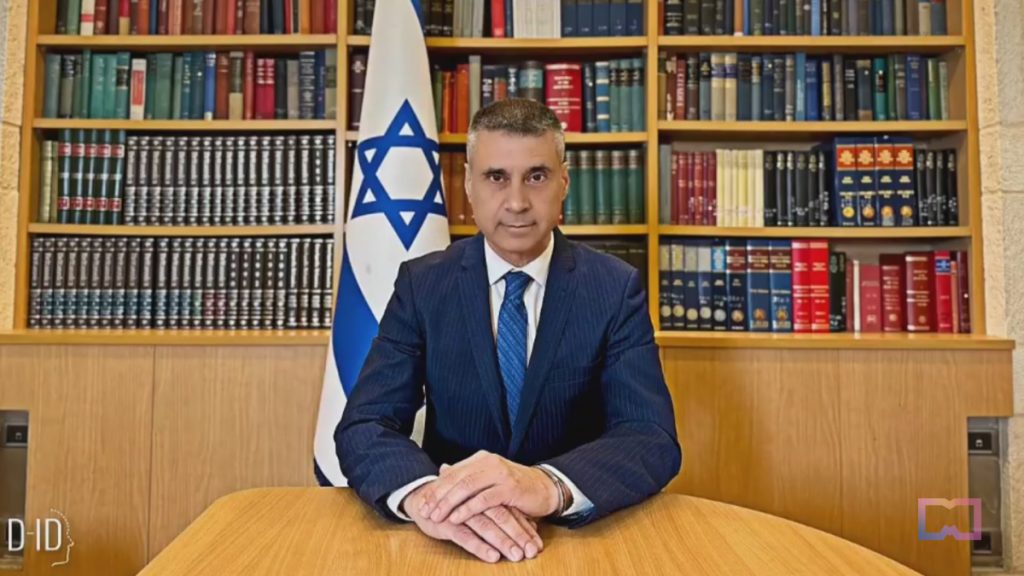Israel is Pioneering the Future of Diplomacy with the Metaverse and Artificial Intelligence.
In Brief
David Saranga has utilized cutting-edge generative AI to convey greetings in eight different languages, highlighting the transformative role of AI in modern digital diplomacy.
In a remarkable initiative, the Israeli government has partnered with D-ID, a startup based in Tel Aviv, to create digital humanoid avatars capable of speaking multiple languages for their diplomatic missions. This innovation allows diplomats to engage with global audiences in their own languages.

Israeli diplomat David Saranga posted videos Saranga used his digital avatar on Twitter to share messages in eight languages, including Arabic, Mandarin, Persian, Greek, Hindi, Portuguese, Russian, and Turkish. Although he may not be fluent in all these languages, this application of AI demonstrates the potential for improving communication across cultures.
Employing AI and the metaverse in diplomatic efforts can offer numerous benefits. Notably, it can bridge language gaps and enhance interactions among individuals from diverse nations. Additionally, it equips diplomats with the tools to analyze extensive data sets, from social media patterns to economic data, thus fostering informed diplomatic strategies.
As the head of digital diplomacy at the Foreign Ministry, Saranga implemented a generative AI video tool to deliver his multilingual address. The innovative Israeli startup has developed sophisticated digital avatars that closely mimic real humans and can converse in various languages. The government is actively leveraging this tech in its digital diplomacy endeavors. D-ID D-ID, established in 2017, has become a leader in generative AI technology. Their focus is on developing digital avatars through text-to-video and image generation, recently extending their capabilities into the metaverse. They have introduced a groundbreaking platform that allows users to hold face-to-face interactions with AI-generated digital characters, underlining their commitment to enhancing user experience with digital personas. The Times of Israel reported .
In a recent chat with a local publication, Saranga acknowledged the rapid evolution of the digital landscape and its implications for diplomacy. He highlighted the necessity to probe the potential of AI and its myriad applications for public service, urging embassy personnel and diplomats to immerse themselves in the AI domain to uncover its offerings.
Saranga remarked that the integration of the metaverse and AI in diplomatic practices is still nascent. The Israeli Embassy in South Korea took a bold step by establishing a diplomatic presence in the metaverse in 2022, claiming a pioneering role. Furthermore, South Korea is one of the most proactive nations in utilizing the metaverse on a global scale.
Last week, Israeli musician Assaf Amdursky made waves by hosting the first concert ever held in the metaverse, marking a historic event. On March 26, his avatar took the stage in a live performance at the Bombay Sapphire Metaverse center, a significant achievement for Israeli creatives that underscores the metaverse's potential as a fresh platform for entertainment. set up funds to embrace this technology further.
Meta has revealed Cicero AI, a potential future diplomat that might outperform human negotiators. Matt Levine from Bloomberg shares insights in 'The Crypto Story,' drawing connections between NFTs and Ponzi schemes, along with a nod to the metaverse. Animoca Brands and TinyTap are set to shake up the educational sector with the auctioning of their second series of Publisher NFTs, kicking off on December 15, 2022.
Read more:
Disclaimer
In line with the Trust Project guidelines Bitcoin, Ethereum, Toncoin: Recap of Last Week’s Crypto Surge - Comprehensive Update and Forecast.







